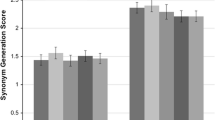Abstract
Several research studies suggest the significant role played by metamemory in lexical abilities of both adults and children. To our knowledge, there have been no studies to date that have explored the role of metamemory (Judgments of Learning) in fast mapping of novel words by adults. One hundred and twelve undergraduate students were given tasks of fast mapping and judgments of learning. A one-way Multivariate Analysis of Variance revealed that participants who performed well on fast mapping had superior global and item-by-item absolute prediction scores compared to poor performers. However, the good and poor performers did not significantly differ in their item-by-item relative predictive accuracy (Goodman–Kruskal gamma correlations) in the immediate as well as the delayed judgments of learning conditions. The possible reasons for inferior gamma correlations, the methodological issues for future research and the clinical implications for the assessment and treatment of adults with lexical deficits are discussed.
Similar content being viewed by others
References
Begg I., Duft S., Lalonde P., Melnick R., Sanvito J. (1989) Memory predictions are based on ease of processing. Journal of Memory and Language 28: 610–632
Bisanz G. L., Vesonder G. T., Voss J. F. (1978) Knowledge of one’s own responding and the relation of such knowledge to learning. Journal of Experimental Child Psychology 25: 116–128
Bloom P. (2000) How children learn the meaning of words. MIT Press, Cambridge, MA
Bower, G., & Winchester, P. (1970). Metamemory judgments. Unpublished manuscript. Stanford University, Palo Alto, CA.
Carey, S., & Bartlett, E. (1978). Acquiring a single new word. In Proceedings of the Stanford child language conference, 15, pp. 17–29.
Dollaghan C. (1985) Child meets word: “Fast mapping” in preschool children. Journal of Speech and Hearing Research 28(3): 449–454
Dollaghan C. (1987) Fast mapping in normal and language-impaired children. Journal of Speech and Hearing Disorders 52: 218–222
Dunlosky J., Nelson T. O. (1992) Importance of the kind of cue for judgments of learning (JOL) and the delayed-JOL effect. Memory and Cognition 20: 374–380
Dunlosky J., Nelson T. O. (1994) Does the sensitivity of judgments of learning (JOLs) to the effects of various study activities depend on when the JOLs occur? Journal of Memory and Language 33: 545–565
Dunlosky J., Nelson T. O. (1997) Similarity between the cue for judgments of learning (JOL) and the cue for test is not the primary determinant of JOL accuracy. Journal of Memory and Language 36: 34–49
Golinkoff R. M., Hirsh-Pasek K., Bailey L. M., Wenger N. R. (1992) Young children and adults use lexical principles to learn new nouns. Developmental Psychology 28: 99–108
Gupta P. (2003) Examining the relationship between word learning, nonword repetition, and immediate serial recall in adults. Quarterly Journal of Experimental Psychology (A) 56: 1213–1236
Gupta P., Lipinski J., Abbs B., Lin P. H., Aktunc M. E., Ludden D., Martin N., Newman R. (2004) Space aliens and nonwords: Stimuli for investigating the learning of novel word-meaning pairs. Behavioral Research Methods, Instruments, and Computers 36: 699–703
Gupta P., Martin N., Abbs B., Schwartz M., Lipinski J. (2006) New word learning in aphasic patients: Dissociating phonological and semantic components. Brain and Language 99: 8–219
Kimball R. D., Metcalfe J. (2003) Delaying judgments of learning affects memory, not metamemory. Memory and Cognition 31: 918–929
Maki R. H., Berry S. L. (1984) Metacomprehension of text material. Journal of Experimental Psychology: Learning, Memory, and Cognition 10: 663–679
Metcalfe J., Finn B. (2008) Familiarity and retrieval processes in delayed judgments of learning. Journal of Experimental Psychology: Learning, Memory, and Cognition 34(5): 1084–1097
Nelson T. O., Dunlosky J. (1991) The delayed-JOL effect: When delaying your judgments of learning can improve the accuracy of your metacognitive monitoring. Psychological Science 2: 267–270
Nelson T. O., Dunlosky J. (1992) How shall we explain the delayed-judgment-of-learning effect? Psychological Science 3: 317–318
Nelson T. O., Dunlosky J., Graf A., Narens L. (1994) Utilization of metacognitive judgments in the allocation of study during multitrial learning. Psychological Science 5(4): 207–213
Nelson T. O., Narens L. (1990) Metamemory: A theoretical framework and some new findings. In: Bower G. H. (eds) The psychology of learning and motivation, Vol. 26. Academic Press, New York, pp 125–173
Service E., Craik F. I. M. (1993) Differences between young and older adults in learning a foreign vocabulary. Journal of Memory and Language 32: 608–623
Spellman B. A., Bjork R. A. (1992) When predictions create reality: Judgments of learning may alter what they are intended to assess. Psychological Science 3: 315–316
Souchay C., Bacon E., Danion J. M. (2006a) Metamemory in Schizophrenia: An exploration of the feeling-of-knowing state. Journal of Clinical and Experimental Neuropsychology 28: 828–840
Souchay C., Isingrini M., Gil R. (2006b) Alzheimer’s disease and feeling-of-knowing in episodic memory. Neuropsychologia 40: 2386–2396
Storkel, H. (1998). The influence of phonotactic probability and metacognition on fast mapping. Dissertation Abstracts International, 59(10B), 5594. (UMI No. AAM 9908895) Retrieved January 05, 2005, from Dissertations and Theses database.
Storkel H. L., Armbruster J., Hogan T. P. (2006) Differentiating phonotactic probability and neighborhood density in adult word learning. Journal of Speech, Language, and Hearing Research 49: 1175–1192
Thiede K. W., Dunlosky J. (1994) Delaying students’ metacognitive monitoring improves their accuracy in predicting their recognition performance. Journal of Education Psychology 86(2): 290–302
Vesonder G. T., Voss J. F. (1985) On the ability to predict one’s own responses while learning. Journal of Memory and Language 24: 363–376
Winn W., Snyder D. (1996) Cognitive perspectives in psychology. In: Jonassen D. H. (eds) Handbook for research for educational communications and technology. Simon & Schuster Macmillan, New York, pp 112–142
Author information
Authors and Affiliations
Corresponding author
Rights and permissions
About this article
Cite this article
Ramachandra, V., Rickenbach, B., Ruda, M. et al. Fast Mapping in Healthy Young Adults: The Influence of Metamemory. J Psycholinguist Res 39, 213–224 (2010). https://doi.org/10.1007/s10936-009-9133-3
Published:
Issue Date:
DOI: https://doi.org/10.1007/s10936-009-9133-3




